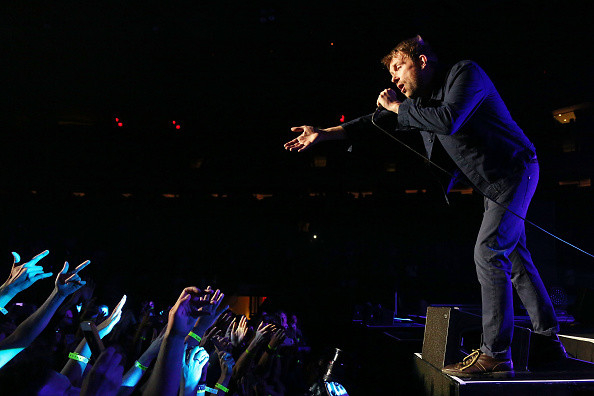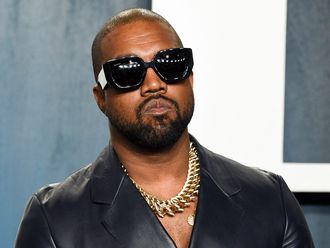
Hong Kong in July can be a disorientating place for outsiders: the suffocating humidity, the density of human bodies, the mind-jarring collision of east and west. Perhaps the last thing you need when you’ve arrived there, brain fuddled with jetlag, is a conversation with Damon Albarn in full manic flow. One minute he’s talking about refusing to leave the stage after a five-hour gig with Africa Express (“Am I addicted to work? Clearly”), the next he’s revealing his passion for picking wild flowers.
Then he starts talking about fairies... “I’ve a house that’s built on a piece of land which was a recognised fairy community,” he says, with a straight face, when we meet backstage at the Hong Kong Convention and Exhibition Centre, where Blur are due to play that night.
(Blur play the Abu Dhabi Grand Prix after-race concert on November 29; entry is for ticketholders only.)
“We had to get a fairy lawyer in. When people come and stay at my house, they go and give them an offering just to keep them happy because we’ve built on their land.”
Hang on ... are you saying you believe in fairies?
Albarn grins, possibly imagining the headlines. “Let’s say I believe in the presence of other things. But have I seen a fairy? I’m not going to tell you ...”
Hong Kong might be fairy-free, but it’s a magical place for Blur. It’s the city they were stranded in for five days in 2013 when the Tokyo Rocks festival they were due to play was cancelled, leaving them with nothing to do but spend a week jamming together on the demos Albarn had knocking around on his iPad. The end result was The Magic Whip, Blur’s first album in 12 years, and one which was almost entirely inspired by the city, from the neon ice-cream artwork to the lyrics concerning overpopulation (There are Too Many of Us) and the recent pro-democracy protests (Ice Cream Man).
It’s an album of serendipity and spontaneity. It’s also an album Albarn has described as “the last piece of the jigsaw of us getting our friendship back together” — a statement of unity from a band of old friends whose frazzled, turbulent relationship almost came to and end when guitarist Graham Coxon, fresh from a spell in the Priory for his drink problems, was asked to leave the band in 2002. Coxon responded by describing his time in the band less than favourably, saying he was “dragged around the [expletive] world on [Albarn’s] megalomaniacal trip”.
He rejoined the band in 2008, but save for a handful of songs, they’ve existed largely as a brilliant nostalgia act, wheeling out the Britpop hits to rapturous response.
Wildly Different
Bassist Alex James says it was a miracle this new album was ever made, but in a way, it’s a miracle Blur ever existed in the first place, such are the wildly different personalities in the band. There’s Albarn, the intense workaholic who will collaborate with anyone from Malian kora players to cartoons; Coxon, the cripplingly shy guitar nerd who couldn’t cope with the band’s gigantic ’90s fame; James, the party animal who subsequently reinvented himself as a gentleman farmer; and drummer Dave Rowntree, about whom people still know so little that they describe him as the “everyman” or “normal bloke” despite the fact he works as a criminal solicitor, has a pilot’s licence and stood as the Labour party candidate for the Cities of London and Westminster, which doesn’t seem very everyman.
My first encounters with each band member (they like to be interviewed separately) highlight just how different they are. Where Albarn greets me with a theatrical zombie walk and a cry of: “I bet you’re thinking, ‘Why the [expletive] have they flown me all the way here?’”, Rowntree is a bit guarded and suspicious (he frets that the headline will end up being “Rowntree says ...”, which, without wanting to be rude, sounds like the words of a man who’s never read a Blur headline). Before those two encounters, I meet James and Coxon in their respective hotel rooms. Coxon is nervy and awkward and barely acknowledges my arrival, whereas James opens the door to the sound of blaring hip hop and jumps into action as the perfect host — making me coffee, telling me to sit anywhere, saying I can have as long as I need. He’s a charmer.
“I’m like a little boy again,” James says of the band’s current position — rave reviews, sold-out shows. He never wanted Blur to stop, knows he was born to do this. “I remember rehearsing in this horrible theatre in Elephant and Castle, in London,” he recalls. “And the first time the lights came on I caught sight of my silhouette, with a bass, and thought: ‘Yep!’”
Coxon is an altogether more complex character. He might struggle to make eye contact and shuffle around the sofa nervously, but he knows how to be cutting: “Ask some stuff that people haven’t asked and people don’t know,” he says at one point, bored by my line of questioning. Coxon’s relationship with Albarn has long been the focal point of the group, and Albarn addresses this relationship on the new song My Terracotta Heart. “I don’t know if I’m losing you again,” he sings in that instantly recognisable melancholic tone.
What did Coxon think when he first heard it? “I thought: ‘Oh [expletive], he’s writing about me again ... What’s he saying?’ It’s odd because it’s pretty bittersweet. It’s not a statement of certainty. Maybe his head was still pretty confused. Because it’s all very well going on stage and having good fun, but brotherly relationships are deeper than people imagine, and it does take time.” Coxon says things are always going to be delicate between them. “You can’t ever go back to being 28 and resolve what was happening then. So even for the last few years, the second-guessing about whether our relationship was OK was still there. But I think with this record we don’t have to worry about it any more.”
Why does your friendship matter so much to other people? “It’s a stupid soap opera for them. It’s obsessed people writing fan fiction and spinning it into some [expletive] on the internet, when actually they don’t know anything about it at all. It’s some weird thrill for them. In the old days, they probably wrote it in a letter and it went into a big sack that was never looked at by the band. Now we have to read all that [expletive] ... Well, you don’t have to, but sometimes you click a button ...”
Albarn offers a different perspective. “I think bands need to have that dynamic, whether it’s the Smiths or the Stone Roses or the Pixies. There’s less of that nowadays; you sense that relationships aren’t as important in electronic pop music.” He says his relationship with Graham is “as good as it’s ever been”. “The most important thing was that Graham took the reins entirely by himself,” Albarn says, of Coxon’s decision, 18 months later, to revisit the Hong Kong recording sessions and stitch them into The Magic Whip with longtime producer Stephen Street. “This was him very clearly saying: ‘I want to be a creative partner again.’ And that was the reason I took it seriously as a proposition.”
Alex and Dave: Political rivals?
Of course, there’s another relationship in Blur that has become increasingly fascinating of late — that of James and Rowntree. Musically, they’re in partnership, as the rhythm section. But while James has become something of a cartoon Guardian hate figure thanks to his connections to the Chipping Norton set, and a notorious photograph of him hanging out with Jeremy Clarkson and David Cameron at his Harvest cheese festival in 2011, Rowntree is a Labour councillor, quietly concerned with campaigning and knocking on doors. He’s devoted to the party and open about his frustrations with the party’s general election campaign. Given all this, he must surely feel annoyed when he sees James embedded with the enemy. “No, nothing about Alex annoys me,” he says, with the skilful swerve of someone who, well, works in politics. “He’s one of my dearest friends, but I don’t know what Alex’s political views are. We do music, not politics. We’re not a four-piece political act. So whether we agree or disagree is neither here nor there. Besides, I don’t surround myself with people who agree with me. Where’s the fun in that?”
I feel bad asking James about the picture with Cameron and Clarkson, partly because he has been such good company — leaning back in his chair, regaling me with old Blur tales with a flourish of cigarette smoke — and partly because I see his face drop when I mention it. “Oh, God. How long ago was it? Four years ago!” he says, before grimacing: “That picture will be on my [expletive] obituary, won’t it? I knew you were going to ask me about that [expletive] picture. Haven’t you [expletive] moved on? Jesus Christ ...” He says he doesn’t regret the prime minister coming to his festival — Cameron is his local MP and he wanted all the big names there — and doesn’t understand why people assume he has turned Tory. “I’ve also spent the last 28 years as one-half of a rhythm section with a Labour party candidate ... and nobody assumes that means I’m a Labour voter.”
Did he speak to Clarkson after he was dropped from Top Gear for punching a producer? James continues to squirm, muttering something about the show’s producer and how they’re all brilliant at what they do, while the coffee machine whirs at volume. Then he says, out of nowhere: “It’s a shame really. There was one tour in America that I had two black eyes. One from Graham and one from Dave. And Damon broke my nose once. But you know ... there was never any question we would split up. We were tighter than ever.”
I can’t tell if this is a reference to Clarkson’s punch or just an attempt to blurt out something that will move the conversation on, but we leave it there. “Dave used to play this game called the Punching Game,” he continues. “We all took it in turns to punch each other.”
Rowntree remembers the game, too. “It wasn’t playful, it really hurt,” he says. “We’d sit on chairs in a big circle and everyone would punch the person to their left as hard as they liked in the head, and it would go on round. Generally it wasn’t too bad. You rarely fell off your chair from being punched in the head too hard, mainly because we were always too drunk.”
“Really brilliant”
Though Albarn was the galvanising force behind getting the band into the studio, Coxon was the most determined to do something with the results, and pull the album over the finishing line. “I guess I wanted to show some form of commitment to fans or friends in the group,” he says. “And I really, really thought — with each passing day — that it contained something really brilliant.”
He says in the past he was always fighting with himself on records, “blocking everything up with guitars”. This time, he was conscious of leaving space for his bandmates. “I was bearing Damon in mind an awful lot,” he says. “Damon likes trains, so for me these songs had to each be a train journey in which I imagined him looking out the window. And I didn’t want a brick wall of guitars as his view. So the rhythm section had to have horizon, the sky and landscape had to be one he wanted to enter. And all the elements had to move and reveal other things behind. It had to be deep and have a sense of parallax. I’m not so insecure these days, I don’t feel like I have to impose things as much as I once did.”
When Coxon talks about insecurity, he’s mostly referring to the ’90s and the height of Britpop, a period he found pretty much unbearable. Did he enjoy any of it? “I suppose there was good times, but at the time I wasn’t allowing myself to enjoy it. I was ruining it for myself. So I can’t look back and change that now. I just felt like I was very immature.”
Blur’s shared musicality, forged through years of playing together, is what makes them such a unique proposition. Despite their diverging characters, it’s the one trait they all share. “For 15 years we were on a massive rags-to-riches caper,” says James. “But we spent all those years playing together. That’s a precious craft that we developed together. Maybe you don’t get that now. The big acts today are singers with session musicians. We played with Pharrell on the Isle of Wight, and I love Pharrell, but it’s weird because it’s all smoke and mirrors really. There are musicians there but it’s mainly backing tapes. And that’s because it’s [expletive] hard — it takes years to [expletive] develop into a band that can really [expletive] knit together like that. And I think that’s why we were able to miraculously make a record in five days, like how they did it in the old days.”
Albarn agrees, and thinks the band’s past — through good and bad — is why the fans connect: “You get something with a real history to it. It’s an accumulative thing, everything we’ve ever experienced is played out again each night. And by not doing a huge amount of shows you do get a wonderful sense of occasion.”
Watching Blur interact onstage it seems crazy to think that such a tight group probably wouldn’t even exist any more if it wasn’t for a festival in Tokyo being cancelled. That’s fate for you. Even now, James admits that, with all their hectic schedules, the band’s existence remains on a knife’s edge.
So are we witnessing the last chapter of Blur?
Rowntree thinks probably not; Albarn says it doesn’t concern him if it is or it isn’t; James says he hasn’t got a clue, he just treats every show like the last. Only Coxon answers with any certainty: “I think it probably is, yeah.” And would he be content with that? “Yeah, I think so.” And why not? After all the black eyes and misjudged photographs, they have worked out a way to tie up loose ends and make things work. You could call it a fairytale ending. If, that is, you believe in fairies.












